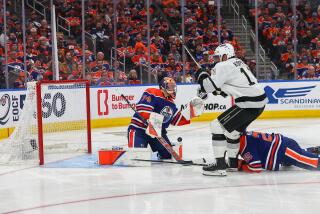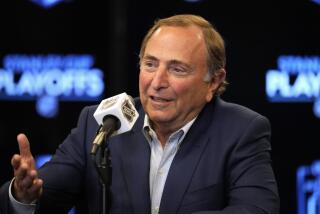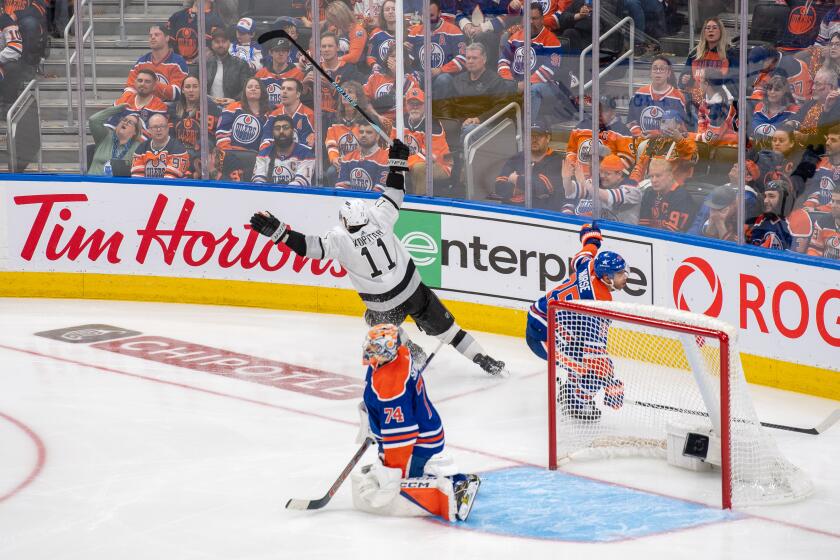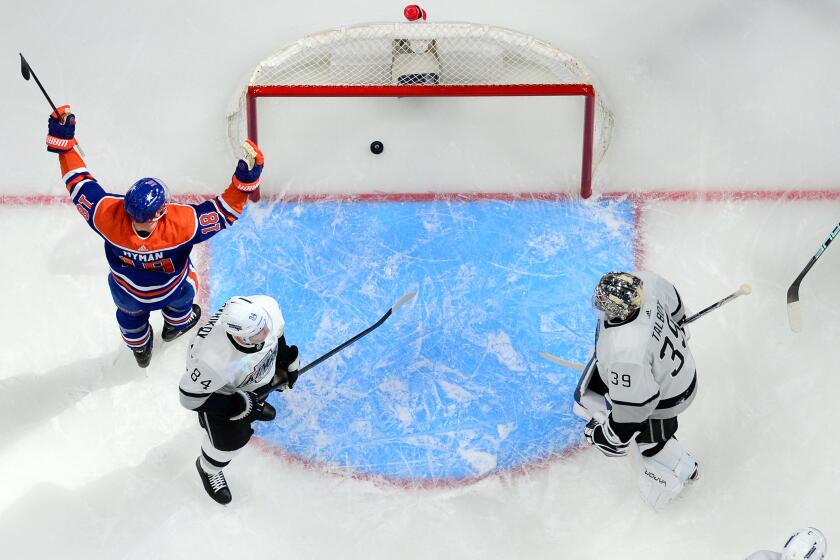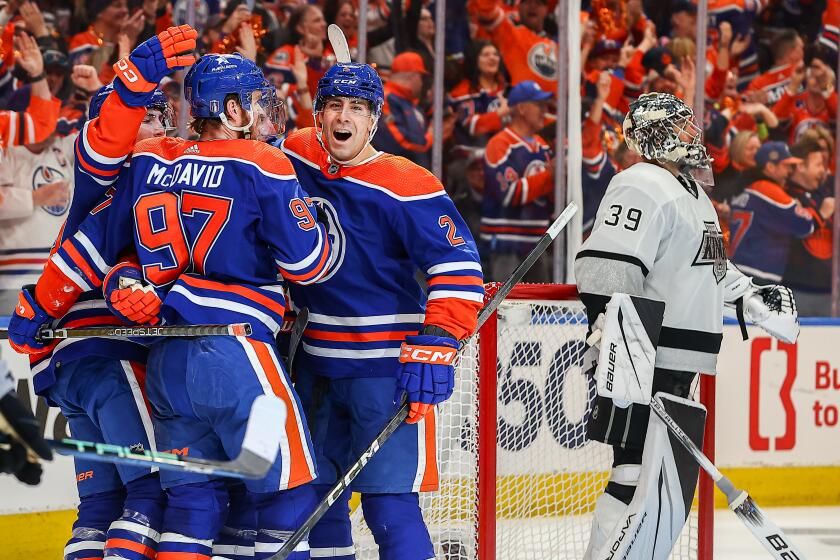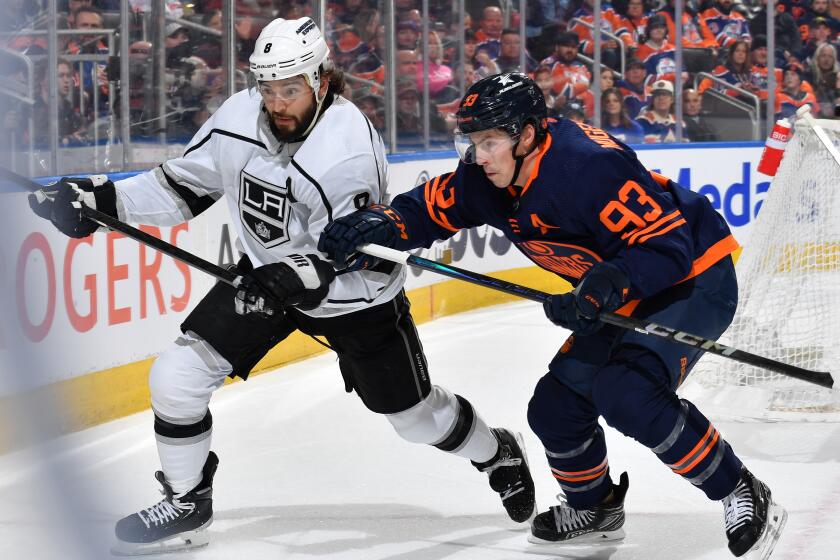Assistant coach John Stevens finds job with Kings to be an easy fit
The man who fired John Stevens as coach of the Philadelphia Flyers last December recommended him to the Kings six months later — and not because Paul Holmgren intended to sabotage them.
Holmgren, the Flyers’ general manager, thought his passionless team needed “a new voice” when he dismissed Stevens after a 1-6 slump dropped the Flyers to 13-11-1. But Holmgren respected Stevens’ teaching ability enough to endorse him for the Kings’ assistant coaching job, which opened when Mark Hardy resigned to fight a sexual abuse charge.
Kings General Manager Dean Lombardi, a former Flyers scout, liked Stevens’ work ethic. So did assistant GM Ron Hextall, who bled Flyers orange and black as a player. Coach Terry Murray was Stevens’ assistant in Philadelphia and a friend since Stevens played for and later coached the Flyers’ minor league team, the Phantoms.
“They all know that John is a man of tremendous integrity and did not need much of a push to hire him,” Holmgren said. “He’s a great fit there.”
Stevens, who played 53 NHL games for the Flyers and Hartford Whalers, is Murray’s top assistant. He inherited Hardy’s duties of working with the defense and overseeing the penalty killing, which ranked 20th in the NHL last season. Under his direction it will be more aggressive, more intent on pressuring the puck.
“He’s changed things up a little bit,” defenseman Jack Johnson said. “He seems like a great guy, easy to talk to.”
The 44-year-old native of Campbellton, Canada, is happy to again be molding careers after watching so many players he had guided reach the Stanley Cup finals last spring.
Stevens followed the Flyers’ playoff run, which ended with a loss to the Chicago Blackhawks, when he wasn’t coaching his two hockey-playing sons.
“I think I watched more as a fan than anything else,” he said. “I had a lot of good relationships with a lot of people in management and players I had for a long time, so I was certainly happy for them and seeing them have success in that environment they worked so hard for.”
The tone of his relationship with younger players might have contributed to his downfall.
Stevens was close to the youngsters he had brought along and was seen as too forgiving of their mistakes compared to his treatment of veterans. His outward calm was widely viewed as a lack of emotion and an acceptance of sloppy habits.
He acknowledged that he is not “an outwardly rah-rah guy,” and that he had been through a lot with the homegrown players — especially those he led to the American Hockey League championship in 2005 — but said he punished or praised everyone as necessary.
“It’s not my style to overly criticize players, but players missed ice time, players missed games. We were very demanding on the conditioning side of things,” he said.
“I have no regrets or reservations about the level of discipline and accountability we had while I was in place there.”
Murray said he can understand how a coach who nurtured players through the minors might have a soft spot for them.
“You do want to be that father image and get close and find out exactly what’s going on in their life away from the rink and help them any way that you can,” Murray said.
“That ties in very well with being an assistant coach. I like that.”
If closeness was one of Stevens’ sins as a head coach, it could work in his favor with the Kings’ young defensemen, who are led by Drew Doughty and Johnson. It already seems to be working.
“He’s making an effort to get to know us individually,” Johnson said. “He’s not trying to make us all the same, but letting us each be as good as we can be at what we’re good at.”
Stevens thinks he could have succeeded in Philadelphia if he had been given a little more time.
“We built a team there that was capable of performing very well at a high level. I’m very confident in saying that had I not been let go that we could have brought that team around,” he said.
“I have no ill feelings toward anyone. It’s an experience that I treasure and one that I look back objectively [on] and try to get better from.”
Stevens is sure to get another NHL head coaching job, and he hopes that will happen someday. But for now this might be the best place for him, working with a staff that knows him and youngsters he should have no trouble getting to know.
“I’m totally absorbed in trying to help the Kings continue to get better,” he said. “They obviously did some great things the last couple of years. This is my focus and I’m not really looking at anything else.”
helene.elliott@latimes.com
twitter.com/helenenothelen
More to Read
Go beyond the scoreboard
Get the latest on L.A.'s teams in the daily Sports Report newsletter.
You may occasionally receive promotional content from the Los Angeles Times.
